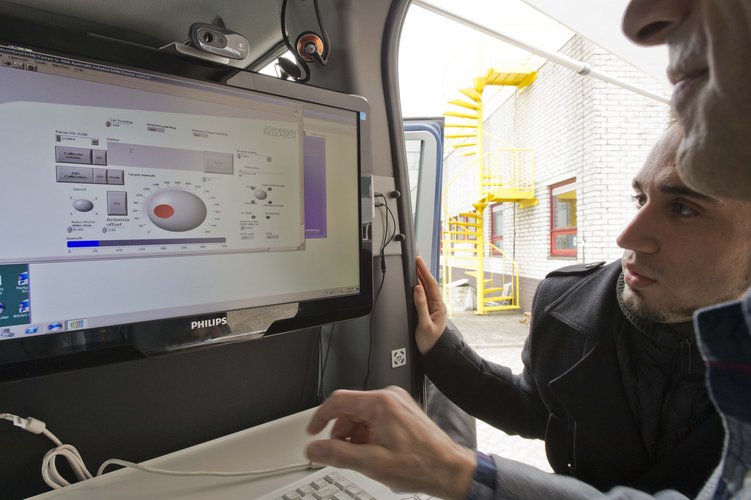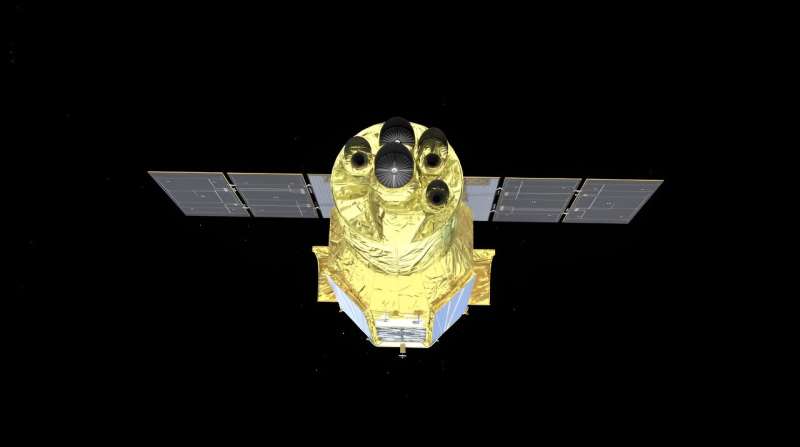
Copernical Team
A new study characterizes regular Moonquakes
 Every morning and afternoon, like clockwork, the surface of the Moon trembles with tiny "moonquakes." Now, new analysis of seismic activity on the Moon has characterized these events and discovered that some of them are not what they seem.
The new research is described in a study appearing in the Journal of Geophysical Research - Planets on September 5.
Without an atmosphere to insul
Every morning and afternoon, like clockwork, the surface of the Moon trembles with tiny "moonquakes." Now, new analysis of seismic activity on the Moon has characterized these events and discovered that some of them are not what they seem.
The new research is described in a study appearing in the Journal of Geophysical Research - Planets on September 5.
Without an atmosphere to insul Here's How Sept. 24 Asteroid Sample Delivery Will Work
 Early morning on Sunday, Sept. 24, the OSIRIS-REx spacecraft's sample capsule will come face-to-face with Earth's atmosphere for the first time since the mission's 2016 launch. On board are an estimated 8.8 ounces, or 250 grams, of rocky material collected from the surface of Bennu in 2020 - NASA's first asteroid sample and the largest ever collected in space.
When it approaches Earth, the
Early morning on Sunday, Sept. 24, the OSIRIS-REx spacecraft's sample capsule will come face-to-face with Earth's atmosphere for the first time since the mission's 2016 launch. On board are an estimated 8.8 ounces, or 250 grams, of rocky material collected from the surface of Bennu in 2020 - NASA's first asteroid sample and the largest ever collected in space.
When it approaches Earth, the Relativity Space signs lease on historic NASA Test Stand
 Relativity Space, has signed an enhanced use lease agreement (EULA) on the vertical test stand at the A-2 complex within NASA's historic Stennis Space Center in Hancock County, Mississippi. The agreement marks the first time a commercial tenant has modernized an underutilized legacy test stand at NASA Stennis, signifying the strength of the public-private partnership between the two entities. Th
Relativity Space, has signed an enhanced use lease agreement (EULA) on the vertical test stand at the A-2 complex within NASA's historic Stennis Space Center in Hancock County, Mississippi. The agreement marks the first time a commercial tenant has modernized an underutilized legacy test stand at NASA Stennis, signifying the strength of the public-private partnership between the two entities. Th SpinLaunch and Sumitomo team up for Low-Cost Space Solutions
 SpinLaunch, a pioneering space company enabling rapid and sustainable low-cost access to space, and the Sumitomo Corporation ("SC") of Japan, a leading Fortune 500 global trading and business investment company, have formed a strategic partnership to expand the global market for affordable and sustainable space services. Sumitomo has also made an investment in SpinLaunch.
In recent years,
SpinLaunch, a pioneering space company enabling rapid and sustainable low-cost access to space, and the Sumitomo Corporation ("SC") of Japan, a leading Fortune 500 global trading and business investment company, have formed a strategic partnership to expand the global market for affordable and sustainable space services. Sumitomo has also made an investment in SpinLaunch.
In recent years, Rocket Lab announces launch window for next Capella Space mission
 Rocket Lab USA, Inc. (Nasdaq: RKLB) has scheduled its next Electron launch during a window that opens September 19, 2023 NZST/UTC. The 'We Will Never Desert You' mission is scheduled to launch from Rocket Lab Launch Complex 1 on New Zealand's Mahia Peninsula for American space tech company Capella Space (Capella), a leading provider of commercial Synthetic Aperture Radar (SAR) imagery.
'We
Rocket Lab USA, Inc. (Nasdaq: RKLB) has scheduled its next Electron launch during a window that opens September 19, 2023 NZST/UTC. The 'We Will Never Desert You' mission is scheduled to launch from Rocket Lab Launch Complex 1 on New Zealand's Mahia Peninsula for American space tech company Capella Space (Capella), a leading provider of commercial Synthetic Aperture Radar (SAR) imagery.
'We Kombucha: Ally for Moon and Mars

ESA is testing kombucha cultures, famous for their fermentative properties and potential health benefits, to assess their resilience in space. These cultures hold great promise for supporting humans on the Moon and Mars.
Galileo becomes faster for every user

ESA satnav receiver vans – driving between the busy heart of Rotterdam, quiet countryside, and the Agency’s ESTEC technical centre – have confirmed that Galileo signals now provide a first position fix more rapidly, while also offering improved robustness in challenging environments and streamlined access to time information.
ULA's Atlas V rocket launched its final NRO mission
 After a series of delays due to Hurricane Ida and "an issue found during a pre-launch ordnance circuit continuity check", for the first time in almost 11 months, a United Launch Alliance (ULA) Atlas V rocket took off from Florida's Space Launch Complex 41 (SLC-41), Cape Canaveral Space Force Station (CCSFS), on Sunday at 8:47 a.m. EDT (1247 UTC).
This marks the second launch of the year fo
After a series of delays due to Hurricane Ida and "an issue found during a pre-launch ordnance circuit continuity check", for the first time in almost 11 months, a United Launch Alliance (ULA) Atlas V rocket took off from Florida's Space Launch Complex 41 (SLC-41), Cape Canaveral Space Force Station (CCSFS), on Sunday at 8:47 a.m. EDT (1247 UTC).
This marks the second launch of the year fo XRISM satellite launches to study the universe in different colors of X-rays

On Sept. 6, a new satellite left Earth; its mission is to tell us about the motions of hot plasma flows in the universe.
Launched from Tanegashima Space Center in Japan, the X-Ray Imaging and Spectroscopy Mission (XRISM) satellite will detect X-ray wavelengths with unprecedented precision to peer into the hearts of galaxy clusters, reveal the workings of black holes and supernovae, as well as to tell us about the elemental makeup of the universe.
XRISM, pronounced "crism," is a collaborative mission between the Japan Aerospace Exploration Agency (JAXA) and NASA, with participation by the European Space Agency.
SpaceX's Starship to remain grounded after explosion probe
 SpaceX's Starship, the most powerful rocket ever built, must remain grounded while Elon Musk's company completes dozens of corrective actions to prevent a repeat of the spectacular explosion that marred its first orbital test flight, regulators said Friday.
The 63 steps include "redesigns of vehicle hardware to prevent leaks and fires, redesign of the launch pad to increase its robustness,"
SpaceX's Starship, the most powerful rocket ever built, must remain grounded while Elon Musk's company completes dozens of corrective actions to prevent a repeat of the spectacular explosion that marred its first orbital test flight, regulators said Friday.
The 63 steps include "redesigns of vehicle hardware to prevent leaks and fires, redesign of the launch pad to increase its robustness," 